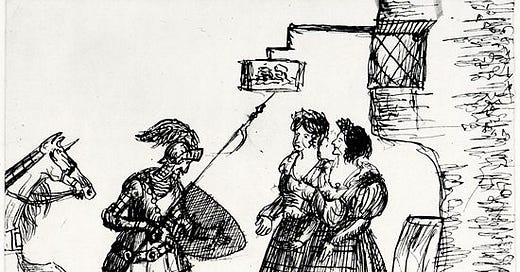Translation: Chapter II, Which treats of the first sallying out from his land which the artful Don Quixote undertook.
Chapter II. Which treats of the first sallying out from his land which the artful Don Quixote undertook.
Having made these preparations, he did not wish to wait any longer to put his thoughts into action, for the belief that his delay was causing a great deal of harm in the world pressed in upon him. He thought of all the wrongs he wished to redress, the twistings to be straightened, the absurdities to be emended, the abuses to be remedied, and the debts to be satisfied. And so, without informing anyone of his intentions and without being seen by any, one morning, before daybreak, which was one of those hot July days, he armored up in all his arms, mounted up on Rocinante, lowered his roughly assembled visor, took up his buckler and lance, and through the false door of a corral sallied out into the fields, with enormous satisfaction and gladness on seeing that his good wish had been granted such an easy beginning. But he had hardly reached the fields when he was assaulted by a terrible thought, and so terrible was it that it nearly made him abandon his just-begun enterprise; for he recalled that he was not knighted a knight. According to the law of chivalry, he neither could nor should take up arms against any knight; and that as long as he was a sort of nouvelle knight he ought to carry dummy weapons, with no sign upon his shield, until he might win one through his own strength.
These thoughts made him wobble in in purpose; but, moved more by his madness than any other reason, he proposed to extract a knighthood from the first knight he might come upon, in imitation of the many others who had done so, according to what he had read in the books that told such stories. As for the matter of the dummy armaments, he thought to clean them, so that they might be more than mere tournament tokens; and with this he quieted his thoughts and proceeded on his way, taking exactly the path that his horse chose, believing that in this lay the path to virtuous adventure.
Therefore our outrageous adventurer, as he meandered down the path, spoke to himself thusly:
“In coming times, when the true history of my famous deeds comes to light, who can doubt that the sage who writes of them, when he comes to the recounting of the morning of this my very first sallying forth, will put the tale in the following manner: ‘Rubicund flushed Apollo had only just stretched out upon the wide and spacious face of the earth the golden threads of his gorgeous hairs, and only the pint-sized painted birdlets with their serrated tongues had saluted with sweet and mellifluous harmony the coming of rosy dawn. Leaving the soft bed of a jealous husband, through the doors and balconies of the manchegan horizon, the sun showed itself to mortals. The famous knight Don Quixote of La Mancha, leaving behind useless decorative plumes, mounted upon his famous horse Rocinante, and began to travel through the ancient and far-famed field of Montiel.’”
And it was true that this was the field through which he traveled. He spoke further:
“Oh happy age and happy century this, from which the light of my famous deeds will shine, worthy of being engraved in bronzes, sculpted into marbles, and painted upon canvases to be remembered in the future. Oh, you enchanted sage, whoever you may be, to whom it has fallen to be the crowner of this pilgrim history, I beseech thee to not forget my good Rocinante, eternal companion of mine in all my careening paths!”
Soon he was speaking again, as if he were truly in love:
“Oh Princess Dulcinea, lady of this captive heart! You have done me much injury by reproaching and dismissing me into a life of rigorous restraint, by commanding me to not appear before thy gorgeousness. I beseech thee, lady, to remember this subject heart, which suffers such longing afflictions for the sake of thy love.”
He continued to fire off other similar speeches, all in the mode of those which his books had taught him, imitating as well as he could their language. Because of this, he traveled so slowly, and the sun rose so hurriedly and with such ardor, that it would have been enough to melt his brains, if he had had any.
Keep reading with a 7-day free trial
Subscribe to The Knight of Sad Semblance: a New Quixote to keep reading this post and get 7 days of free access to the full post archives.




